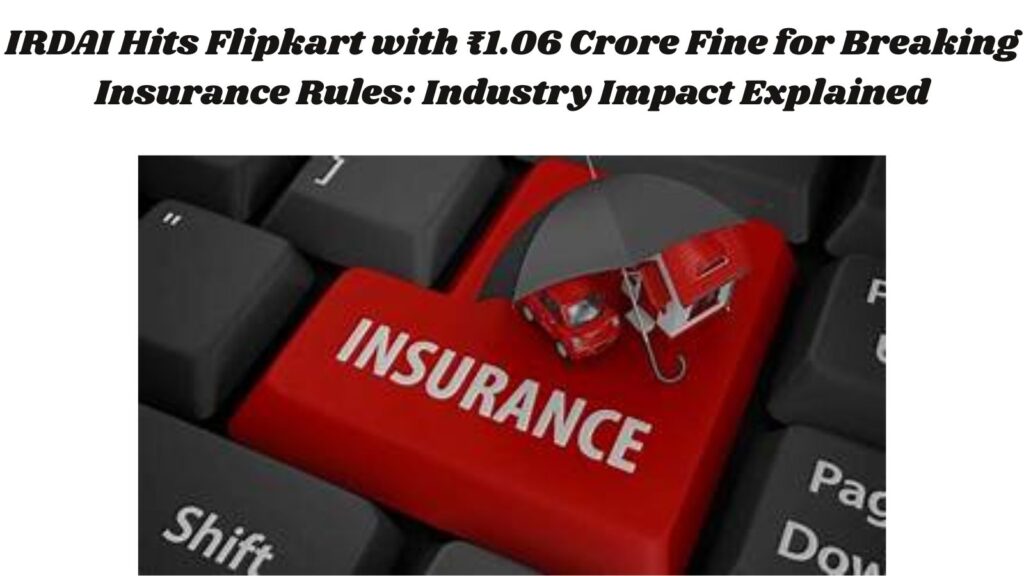The Insurance Regulatory and Development Authority of India (IRDAI) has fined Flipkart ₹1.06 crore. This penalty is for not following rules related to insurance e-commerce and corporate agents.
Here’s what this means for the industry:
- Increased Scrutiny: Other companies may face more checks to ensure compliance.
- Impact on Services: Flipkart might change its insurance offerings to align with regulations.
- Market Confidence: This could affect consumer trust in online insurance platforms.
Overall, the fine highlights the need for strict adherence to insurance norms in the e-commerce sector.

A Wake-Up Call for E-Commerce and Insurance Sectors
Contents
- 1 A Wake-Up Call for E-Commerce and Insurance Sectors
- 2 The Violations: Breaches of E-Commerce and Corporate Agent Norms
- 3 The Impact of These Violations
- 4 IRDAI’s Response and Future Outlook
- 5 Conclusion: Key Takeaways and Moving Forward
- 6 FAQs
- 6.1 What are the Insurance E-commerce Guidelines, 2017?
- 6.2 What is the role of the Certificate of Registration (CoR) for corporate agents?
- 6.3 Why was Flipkart penalized for selling insurance without a valid CoR?
- 6.4 What should e-commerce platforms do to comply with IRDAI regulations?
- 6.5 How can Flipkart appeal the penalty?
The Insurance Regulatory and Development Authority of India (IRDAI) fined Flipkart ₹1.06 crore. Flipkart is one of India’s top e-commerce platforms. The penalty is for breaking insurance e-commerce and corporate agent rules. This penalty comes from violations about selling and promoting insurance policies. This is a growing issue in the digital economy.
Online platforms are now vital in insurance sales. This case reminds digital insurance businesses to follow the strict rules set by IRDAI. As the Indian insurance market grows, big players like Flipkart and smaller firms need to understand compliance details.
This article looks at Flipkart’s violations, the penalties it received, and the impact on the insurance industry. We’ll also discuss the broader effects on regulatory frameworks in our changing digital economy.
The Violations: Breaches of E-Commerce and Corporate Agent Norms
IRDAI penalized Flipkart for two reasons. First, it violated the 2017 Insurance E-commerce Guidelines. Second, it sold insurance policies without proper registration.
1. Breach of Insurance E-Commerce Guidelines, 2017
Flipkart faced a hefty penalty of ₹1 crore. This fine was due to its violation of the Insurance E-commerce Guidelines, 2017. E-commerce platforms like Flipkart can connect insurers and customers. However, they must follow strict rules for their operations.
These guidelines have a key clause. It limits the number of insurers an insurance intermediary can enroll on an Insurance Self-Network Platform (ISNP). These guidelines say that only approved insurers can be sold on the platform.
When a user clicked the “Buy Insurance” button on Flipkart’s ISNP-approved site, they were taken to an external insurance intermediary’s page. IRDAI saw this redirection as a violation. They called it an unauthorized way to solicit insurance. Flipkart defended its actions, saying it offered digital advertising space. However, the regulatory body claimed this was more than just advertising. They noted it was tied directly to redirecting customers to complete policy purchases.
The penalty shows the regulator wants to enforce the guidelines. This helps keep transparency, fairness, and consumer protection in the insurance sector.
2. Selling Insurance Without a Valid Certificate of Registration (CoR)
Flipkart faced a ₹1 crore fine. It also received a ₹6 lakh penalty for selling insurance policies while seeking to renew its Certificate of Registration (CoR). The IRDAI (Registration of Corporate Agents) Regulations, 2015 state that a corporate agent needs a valid CoR. This certificate must be renewed regularly.
In this case, Flipkart continued to sell insurance policies while awaiting approval for the renewal of its CoR. IRDAI rules state that a renewal application won’t extend a CoR by itself. The authority must give clear approval for it to happen. This resulted in a violation of the Clause 3(ii)(a) of Schedule III, as well as Regulation 26 of the 2015 regulations.
Flipkart stopped operations when it learned about the issue. However, it had already sold many policies in a short time, making the violation worse.
The Impact of These Violations
1. Consumer Protection and Transparency
These violations underscore the importance of maintaining transparency in the insurance distribution process. Digital platforms are selling more financial products. So, it’s important to protect consumers from misleading or unauthorized offers. The IRDAI shows its commitment to making sure e-commerce platforms run honestly. This way, customers can easily access licensed insurers without outside interference.
2. Strengthening Regulatory Frameworks for E-Commerce Platforms
The penalty also serves as a wake-up call for other players in the e-commerce and digital insurance space. Insurance companies and tech firms are teaming up to change how policies are distributed. So, regulators need to make sure these partnerships meet industry standards. Flipkart’s case shows how an intermediary platform can accidentally break rules. This can hurt consumer trust.
Insurers must carefully structure their partnerships with e-commerce platforms. This helps avoid mistakes similar to Flipkart’s. This means meeting all legal requirements. Also, no unauthorized third parties should be involved in sales.
Real-Time Example: The Growth of Digital Insurance Sales in India
Flipkart’s case shows a larger trend. E-commerce platforms are becoming key places for insurance distribution. For instance, Amazon, Policybazaar, and PhonePe have joined this space. They use the wide reach of online platforms to promote insurance products.
These platforms help customers by providing easy access to many insurance options. They must also follow the rules closely. Failure to comply, as seen in the Flipkart case, can lead to penalties and damage to reputation.
Fun Fact: The Insurance E-commerce Guidelines, 2017 aimed to stop fraud. They ensure e-commerce platforms offer real, authorized insurance products. This helps prevent misleading or cheating customers.
IRDAI’s Response and Future Outlook
The IRDAI has clearly outlined its stance on ensuring that e-commerce platforms comply with its guidelines. The ₹1.06 crore fine on Flipkart sends a clear warning to digital insurance intermediaries. It shows how crucial it is to follow legal rules. It shows the need for more oversight in the quickly changing digital insurance market.
Flipkart needs to rethink how it sells insurance. It must make sure that future actions meet regulatory standards. Flipkart can appeal the decision to the Securities Appellate Tribunal (SAT). They have the chance to contest the penalty. This case has already set an important precedent in digital insurance.
Conclusion: Key Takeaways and Moving Forward
The ₹1.06 crore penalty on Flipkart by IRDAI is a key lesson for everyone in India’s insurance and e-commerce sectors. Online platforms are growing in the insurance sector. They need to prioritize compliance, transparency, and consumer protection.
Key Takeaways:
- E-commerce sites that sell insurance must follow the Insurance E-commerce Guidelines from 2017.
- Corporate agents need a valid Certificate of Registration (CoR). They must also process renewal applications correctly to prevent any disruptions.
- Digital insurance sales are on the rise. This trend needs regulators and platforms to stay alert. They must ensure ethical practices and protect consumers.
As the industry evolves, we expect more regulatory measures to be implemented to ensure fair practices. Flipkart’s case shows that not following insurance rules can lead to big fines and harm to a company’s image, even if it happens by accident.
FAQs
What are the Insurance E-commerce Guidelines, 2017?
The Insurance E-commerce Guidelines, 2017 are rules from IRDAI. They control how insurance intermediaries, like e-commerce sites, sell insurance online. The guidelines make sure platforms provide insurance only from authorized insurers. They also stop users from being sent to unauthorized third-party websites.
What is the role of the Certificate of Registration (CoR) for corporate agents?
The Certificate of Registration (CoR) is required for any corporate agent wishing to sell insurance products in India. It certifies that the corporate agent has met all regulatory requirements and can operate legally in the market. Failure to maintain a valid CoR is a violation of IRDAI regulations.
Why was Flipkart penalized for selling insurance without a valid CoR?
Flipkart was penalized for selling insurance policies while its CoR renewal was pending. IRDAI regulations require that a corporate agent can only sell insurance if it holds a valid CoR. The sale of policies without a valid CoR constitutes a violation of regulatory rules.
What should e-commerce platforms do to comply with IRDAI regulations?
E-commerce platforms must only enroll approved insurers. They should not redirect customers to unauthorized websites. Also, they need to keep valid certification and registration as corporate agents. Regular audits and compliance checks are also recommended.
How can Flipkart appeal the penalty?
Flipkart can appeal the penalty to the Securities Appellate Tribunal (SAT). The SAT will review the case and decide if it will keep or change the IRDAI’s decision.


